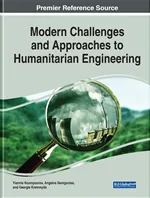Modern Challenges and Approaches to Humanitarian Engineering
Yiannis Koumpouros (University of West Attica, Greece), Angelos Georgoulas (University of West Attica, Greece) and Georgia Kremmyda (University of Warwick, UK)
The ENHANCE team are proud to present our first book "Modern Challenges and Approaches to Humanitarian Engineering". This book has emerged from our conference - the First International Symposium on Humanitarian Engineering Challenges and Approaches, and contains work by ENHANCE collaborators from all participating institutions as well as members of our broader network.
The book is published by IGI and available via IGI Global.Link opens in a new window
Release Date: March, 2022 | Copyright: © 2022 | Pages: 321 | Chapters: 13
DOI: 10.4018/978-1-7998-9190-1
ISBN13: 9781799891901 | ISBN10: 1799891909 | EISBN13: 9781799891925 | ISBN13 Softcover: 9781799891918
The 21st century is associated with a number of environmental, social, and economic challenges spanning from globalization and migration to climate change, global health, urbanization, and natural hazards. These challenges of the modern age command our immediate reaction towards an equal society. There is an urgent need for scientists, researchers, and politicians to take the reins by providing immediate solutions to tackle this harsh reality. The need for a more human approach has recently led to what we call humanitarian engineering.
Modern Challenges and Approaches to Humanitarian Engineering provides relevant theoretical frameworks and the latest empirical research findings in this area. It discusses the most recent challenges and approaches in the field of humanitarian engineering and presents research, case studies, and innovative models. Covering topics such as contact tracing apps, scientific production, and sustainable management, this book is an essential resource for engineers, government officials, scientists, activists, humanitarians, emergency management agencies, students and educators of higher education, researchers, and academicians.
The many academic areas covered in this publication include, but are not limited to:
- Antibiotic Resistance
- Artificial Intelligence
- Contact Tracing Apps
- Disabled Population
- Humanitarian Responses
- Natural Hazards
- Personal Data Processing
- Scientific Methods
- Scientific Production
- Successful Aging
- Sustainable Management
- Water Supply
